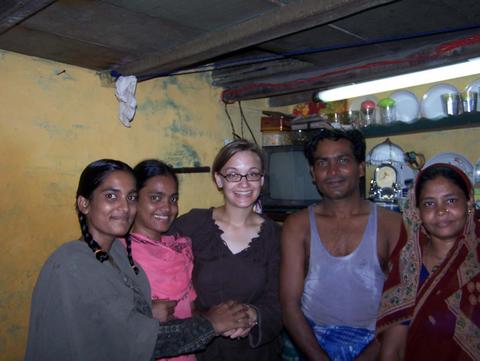
In an early post, I had referred to Mahatma Gandhi’s Dandi March (1930). The great Salt March is an event that shook the British Empire. On the 5th of April 1930, Gandhi wrote in a message:
“I want world sympathy in this battle of Right against might."
I remembered these words this morning, as I concluded my discussion with Eeva Puumala, a student of international relations from Finland. She is in Calcutta, trying to understand the life of migrant workers in the city.
Gandhi’s words would be an apt description for what I have been doing over the last few days. I have been communicating with, meeting, talking to and showing around several visitors to my city (foreign as well as Indian). Some of them also came in contact with me through this blog.
Remembering Mahatma Gandhi’s salt march, also brought to mind the words of Jesus Christ, from the Sermon on the Mount:
"Ye are the salt of the earth: but if the salt have lost his savour, wherewith shall it be salted? It is thenceforth good for nothing, but to be cast out, and to be trodden under foot of men."
In my personal long march against the might of deeply entrenched social and institutional apathy, which I began exactly 10 years ago, I suppose I have been trying to find “my salt”, and also my “community of salt”. In India, there is also a conception of honour and loyalty which is associated with “salt”: to be true to one whose salt one has eaten. So I have also implicitly been trying to be true to the labouring poor of my city.
I briefly saw some images on tv at the time of the carnage in Rwanda in 1994. The world is aware of that. I would like to think something like that will never happen again, that the international community will ensure that. But what you see in Calcutta – is not as dramatic, or sudden. Here there is an ongoing, relentless process of systemic consignment of hundreds of thousands of people, to a life of acute hardship, misery, deprivation. Thousands of poor infants and women die needlessly. So Calcutta is like another kind of Rwanda, one where something terrible happens imperceptibly, as part of normal daily life. And even as the horrific tragedy happens, life goes on, for people in Calcutta and everywhere else in the world.
What I see around me in Calcutta – makes me want to scream, an act of earth-shattering, as well as self-annihilation. I have seen Edvard Munch’s painting, “The Scream”, at the Munch Museum in Oslo (before it was stolen). I can understand and identify with Munch’s image.

Meeting Eeva, reminded me of another visitor to Calcutta, last year: Fritzi, from Germany. Accompanying a post in this blog on Mike Davis' article "Planet of Slums", I had put up an image of Fritzi with a family in Priya Manna Basti, Howrah, bearing a caption taken from Davis' question:
"Can disincorporated labour be reincorporated in a global emancipatory project?"



2 comments:
The process of annhiliation in Rwanda was accelerated and spontaneous. It was driven by active forces. In Calcutta and elsewhere, the process that decimates the powerless is slow and methodical. It is predictable; this may make it more of a "crime".
Who is the criminal? He is a member of the group that is not powerless, in other words, everybody else. The decimation of the powerless is attained by a process. The process is driven by passive forces. When I turn on my car's air conditioner and drive quickly past a homeless family, I am passively accepting the genocide of the powerless. It would have been the same for me to revel in an opera by Wagner during 1940 Germany, while people outside wore emblems on their shirts. In our age there are different emblems.
The New Man would change the world if he could. He would walk among the powerless and give them some power. He would concede some of his power.
I cannot make myself into the New Man by myself. I am selfish by nature and emmersed in the work and pleasures of my life. Despite my thinking I await the formation of a greater consciousness, arising from somewhere outside of myself that will create mass conversion among the powerful. I do not know whether this consciousness would involve us on a voluntary basis. It may involve something violent, like a revolution. These things we cannot predict. What we can predict though is that the poor will be very angry as soon as they become educated about their condition.
Dear brother James
Thanks so much for articulating so precisely exactly what we are faced with here.
The New Man would like to change the world. But he is not permitted to. So its only the wrath and fury of the "wretched of the earth" that may bring change, if at all.
Best
babloo
Post a Comment